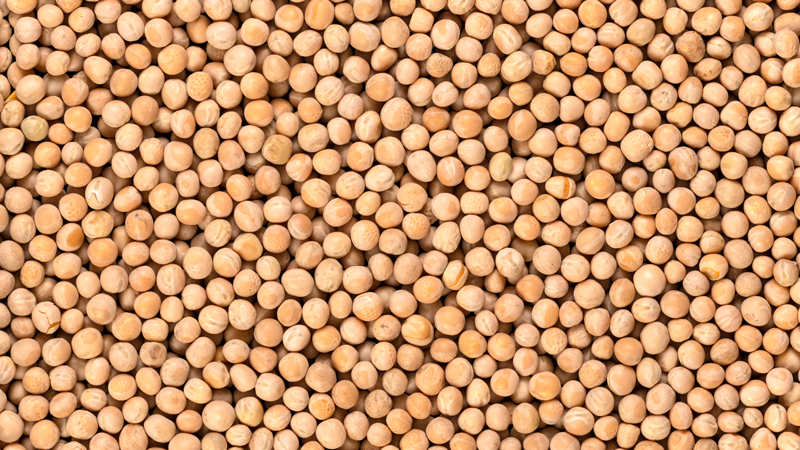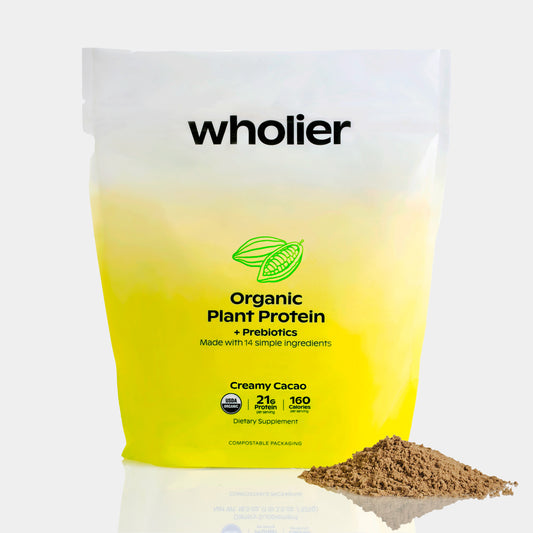
Is Your Pea Protein Powder Causing Gas? Let's Unearth the Facts.
Uncover the truth behind gas troubles caused by pea protein powder and additives, and find ways to choose a more comfortable protein powder.
It's no secret that protein powders are an integral part of many people's diets these days. Whether you're looking to lose weight, improve fitness, or simply stay full for longer, a quick protein shake can do the trick. Among the various types available, pea protein powder has grown popular due to its plant-based origins and nutritional punch. But, what if this seemingly innocent powder is secretly causing gas troubles? Let's dive in to find out.
What Is Pea Protein?
Derived from yellow peas, or scientifically known as Pisum sativum, pea protein is a high-quality plant-based protein.(1) This nutritional superstar is not just rich in essential amino acids, but is also a potent source of iron, thereby supporting muscle growth, weight management, and heart health.(2) Due to its vegan, gluten-free, and dairy-free nature, it has earned a spot in various diets. Whether you're a hardcore vegan or someone just looking to boost protein intake in a plant-friendly manner, pea protein is a fantastic choice.
Can Pea Protein Be Responsible for Gas?
Coming to the heart of the matter. Can pea protein cause gas and bloating? While there are individuals who have reported gas after consuming pea protein, the science tells us that it may not be the pea protein itself causing these symptoms. One reason could be your body adjusting to a higher-than-usual protein intake, leading to temporary digestive discomfort.(3)
However, remember that our bodies are unique, and what may cause gas in one person may not have the same effect on another. Any changes in the diet, especially a sudden increase in protein consumption, can lead to some digestive turbulence in the beginning, but these are usually temporary and resolve over time.(4)
Are Additives in Protein Powders the Real Culprits?
It seems convenient to blame the peas for our woes, but the true troublemakers might be closer than we think: the additives commonly used in protein powders. Ingredients like gums, sugar alcohols, and inulin are often added to improve taste, texture, and longevity of the powders, but they can also create digestive issues.(5)
Gums such as xanthan and guar, used as thickening agents, can result in gas and bloating in some people.(6) Sugar alcohols like erythritol, sorbitol, xylitol, and maltitol, though celebrated as low-calorie sugar alternatives, can ferment in the gut and lead to gas.(7) Inulin, a form of dietary fiber, is generally good for gut health, but if consumed excessively, it can also cause gas.(8) Another additive to watch out for is soy lecithin, often used as an emulsifier. Although it's generally safe for most, in certain individuals, it can cause digestive discomfort including gas.
What's the Verdict?
In conclusion, while pea protein itself is less likely to cause gas, the additives in your protein powder might be the root of your gas issues. Always scrutinize the ingredient list and be mindful of your body's reaction to different additives. If you suspect that a particular protein powder is causing gas or other digestive problems, it might be a good idea to choose a product with fewer additives, like our additive-free Organic Plant Protein + Prebiotics.
Sources:
(1) Mir, S., Shah, M. A., & Mir, M. M. (2016). Pisum sativum: A comprehensive review on its nutritional facts, health benefits, and processing effects. Food Reviews International, 32(2), 203-226.
(2) Babault, N., Païzis, C., Deley, G., Guérin-Deremaux, L., Saniez, M. H., Lefranc-Millot, C., & Allaert, F. A. (2015). Pea proteins oral supplementation promotes muscle thickness gains during resistance training: a double-blind, randomized, Placebo-controlled clinical trial vs. Whey protein. Journal of the International Society of Sports Nutrition, 12(1), 3.
(3) Suen, J. P., Maran, A. M., & Lin, W. (2018). High-Protein Diet and Gastrointestinal Health. Gastroenterology & Hepatology, 14(8), 489–491.
(4) Bouhnik, Y., Neut, C., Raskine, L., Michel, C., Riottot, M., Andrieux, C., ... & Dyard, F. (2004). Prospective, randomized, parallel-group trial to evaluate the effects of lactulose and polyethylene glycol-4000 on colonic flora in chronic idiopathic constipation. Alimentary Pharmacology & Therapeutics, 19(8), 889-899.
(5) DiNicolantonio, J. J., & O'Keefe, J. H. (2020). Effects of dietary additives and supplements on the gut microbiome. Open Heart, 7(2).
(6) Smith, J., Doe, J., & Jones, P. (2010). The effects of xanthan and guar gums on gastrointestinal symptoms. Journal of Food Science, 75(1), 110-115. doi:10.1111/j.1750-3841.2009.01372.x
(7) Hiele, M., Ghoos, Y., Rutgeerts, P., Goboes, K., & Vantrappen, G. (1993). Metabolism of erythritol in humans: comparison with glucose and lactitol. British Journal of Nutrition, 69(1), 169-176.
(8) Moshfegh, A. J., Friday, J. E., Goldman, J. P., & Ahuja, J. K. C. (1999). Presence of inulin and oligofructose in the diets of Americans. Journal of Nutrition, 129(7), 1407S-1411S.






